All data and simulations contained herein are taken from
Dougalis, A.G., Matthews, G.A.C., Liss, B. & Ungless,
M.A. (2017). Ionic currents influencing autorhythmicity and pacemaking
in dopamine neurons of the ventrolateral periaquaductal gray and
dorsal raphe nucleus (vlPAG/DR): a voltage-clamp and computational
modeling study. Journal of Computational Neuroscience,
doi: 10.1007/s10827-017-0641-0. [Apr 3-2017. Epub ahead of print]
All conductance files are organised in a modular form for simplicity
in *.mod file format (nine files). Current descriptions are based on
experimental data from adult brain slices and are given a Hodgkin and
Huxley formalism by describing the voltage and time dependence of the
activation and inactivation gating variables with single order
Boltzmann functions.
To run the simulations make sure that you have NEURON installed in
your computer. Download the vlPAG/DRN model folder containing all
simulation files.
Under mswin:
------------
Run the mknrndll.exe (from the NEURON installation
folder) and specify the vlPAG/DRN DA model folder as the target folder
in order to compile the .mod files contained therein into an
nrnmech.dll library file.
Under unix/linux:
----------------
Type nrnivmodl in the terminal window after cd'ing to the extracted folder.
If you need more help see the file:
https://senselab.med.yale.edu/ModelDB/NEURON_DwnldGuide.html
After you have compiled the mod files:
--------------------------------------
The main hoc initiation file of the model is named mosinit.hoc. Double
click on this to load automatically 1. the membrane mechanisms (given
that you have compiled correctly the nrnmech.dll file of all .mod
files contained in this folder in the previous step) and 2. four
successive session files (.ses) that contain the required Graphical
user Interface to run simulations, visualise the results, reproduce
results from figures 7-10 from Dougalis et al., 2017. J Comput
Neurosci and save all results from resulting simulations to a file
(vlPAG_DRN Analysis.dat) if required.
Double clicking the vlPAG_DRN DA model.hoc file will load NEURON and
you should expect to get a welcome message and a help file loading
automatically when you follow the instructions. Read the help file and
inspect the simulator panels and graphical windows. The three
graphical windows monitor the voltage (in mV) of the DA neuron (top
window) and the inward (middle window) and outward (bottom window)
current (in mA/cm2) flowing in simulation time (in ms, set to total
simulation time of 5000ms) for all ionic conductances of the
model. The simulations reproduce figure 9 from Dougalis et al., 2017 J
Comput Neurosci.
Figures 9a, b, and c are represented:

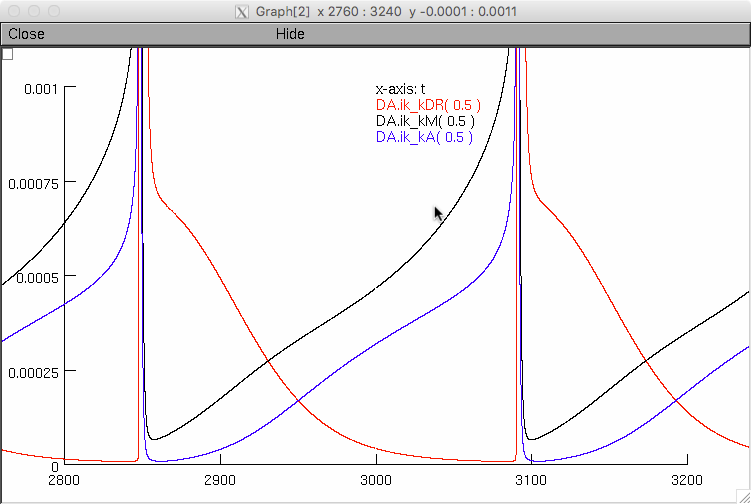
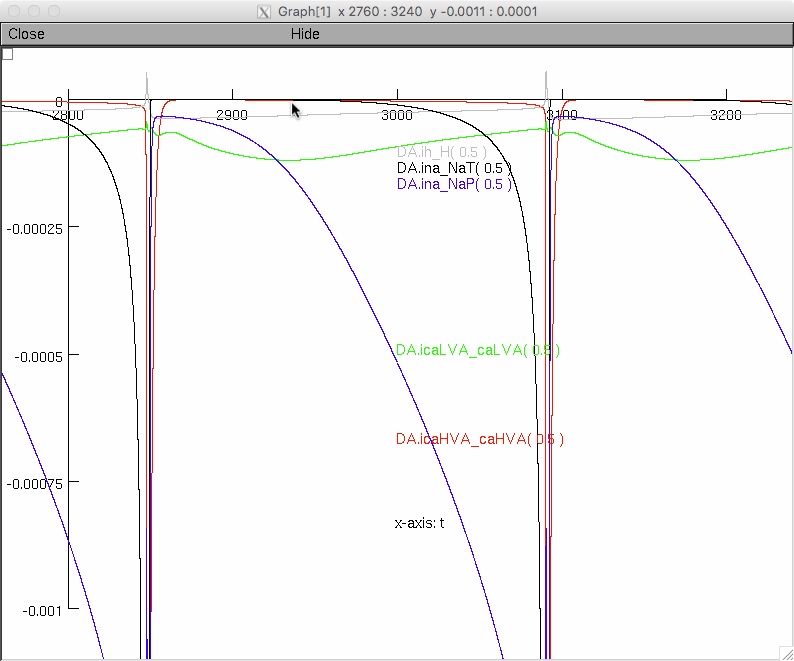 Using the current/voltage clamp electrode located on the DA neuron,
current clamp injections are possible for predifined polarity,
duration and amplitude. Use these to explore the H-current mediated
voltage sag and A-type mediated delayed reporalisation as well as
instantaneous/sustained firing and threshold for depolarisation block
and thus reproduce Figures 7 and 10 from Dougalis et al., 2017 J
Comput Neurosci. Use the electrode in voltage clamp mode to observe
the current flowing from indvidual ionic conductances during the
voltage steps. Finally, using the parameter box, the user has full
access to experiment with the model by altering a number of critical
parameters controling individual conductances (reversal potential,
maximal conductance, midpoints and slope of activation and
inactivation of the gating mechanisms).For instance, by changing the
maximal conductance (gbar) of any ionic conductance while observing
the firing rate the data in Figure 8 from Dougalis et al., 2017 J
Comput Neurosci can be reproduced. Further parameters that control the
model behavior including, the rate of activation/inactivation of the
gating mechanisms, can be accessed from the NEURON main menu through
the following path NEURON main
Menu--Tools--Distributed_Mechanisms--Viewer--Name_Values--Parameters.
Any queries or problems with the model can be addressed to
antoniosdougalis at hotmail.com
last model file update: 17th April 2017, Antonios Dougalis
Figures from the paper:
Fig. 7:
Using the current/voltage clamp electrode located on the DA neuron,
current clamp injections are possible for predifined polarity,
duration and amplitude. Use these to explore the H-current mediated
voltage sag and A-type mediated delayed reporalisation as well as
instantaneous/sustained firing and threshold for depolarisation block
and thus reproduce Figures 7 and 10 from Dougalis et al., 2017 J
Comput Neurosci. Use the electrode in voltage clamp mode to observe
the current flowing from indvidual ionic conductances during the
voltage steps. Finally, using the parameter box, the user has full
access to experiment with the model by altering a number of critical
parameters controling individual conductances (reversal potential,
maximal conductance, midpoints and slope of activation and
inactivation of the gating mechanisms).For instance, by changing the
maximal conductance (gbar) of any ionic conductance while observing
the firing rate the data in Figure 8 from Dougalis et al., 2017 J
Comput Neurosci can be reproduced. Further parameters that control the
model behavior including, the rate of activation/inactivation of the
gating mechanisms, can be accessed from the NEURON main menu through
the following path NEURON main
Menu--Tools--Distributed_Mechanisms--Viewer--Name_Values--Parameters.
Any queries or problems with the model can be addressed to
antoniosdougalis at hotmail.com
last model file update: 17th April 2017, Antonios Dougalis
Figures from the paper:
Fig. 7:
 Fig. 8:
Fig. 8:
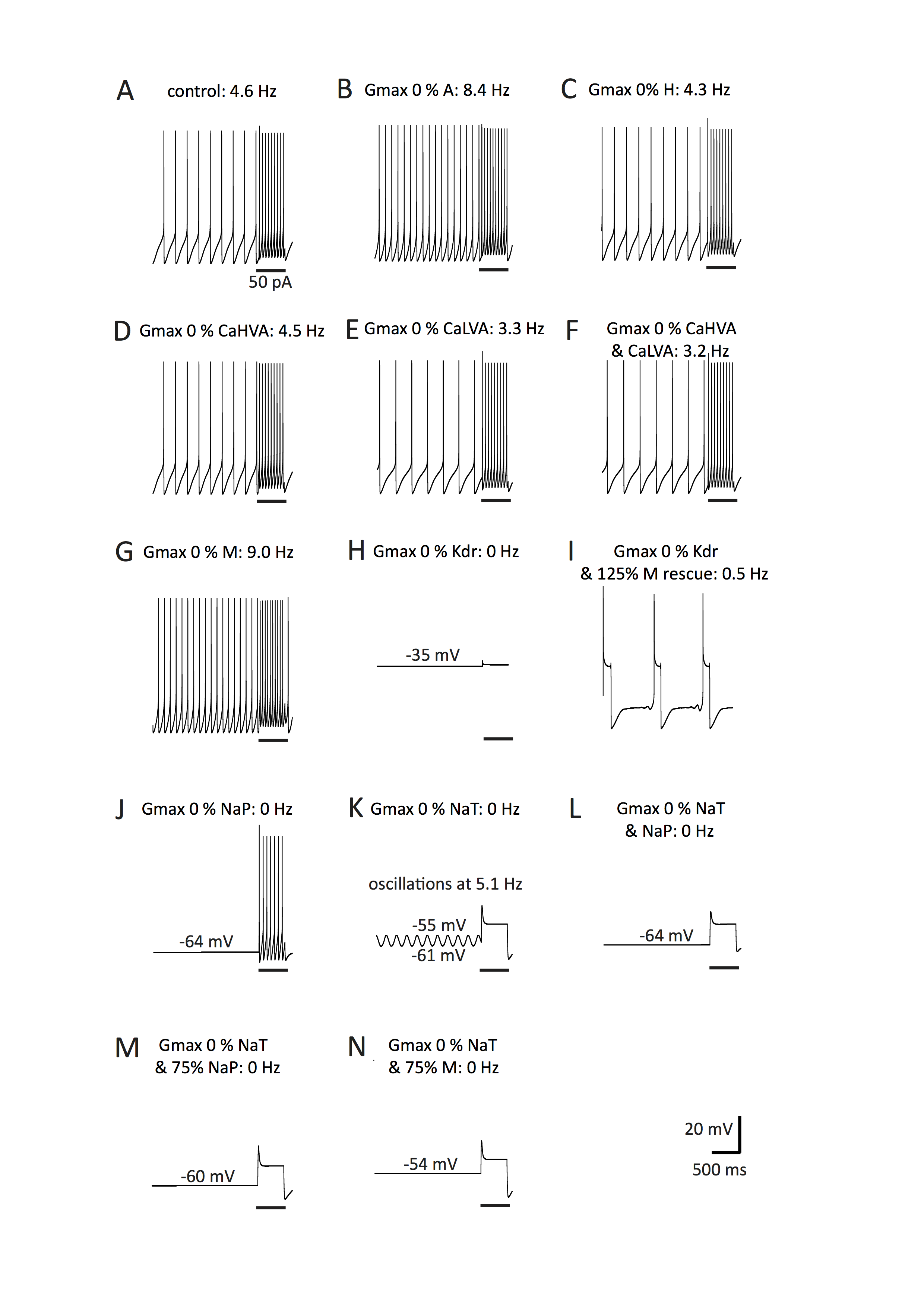 Fig. 9:
Fig. 9:
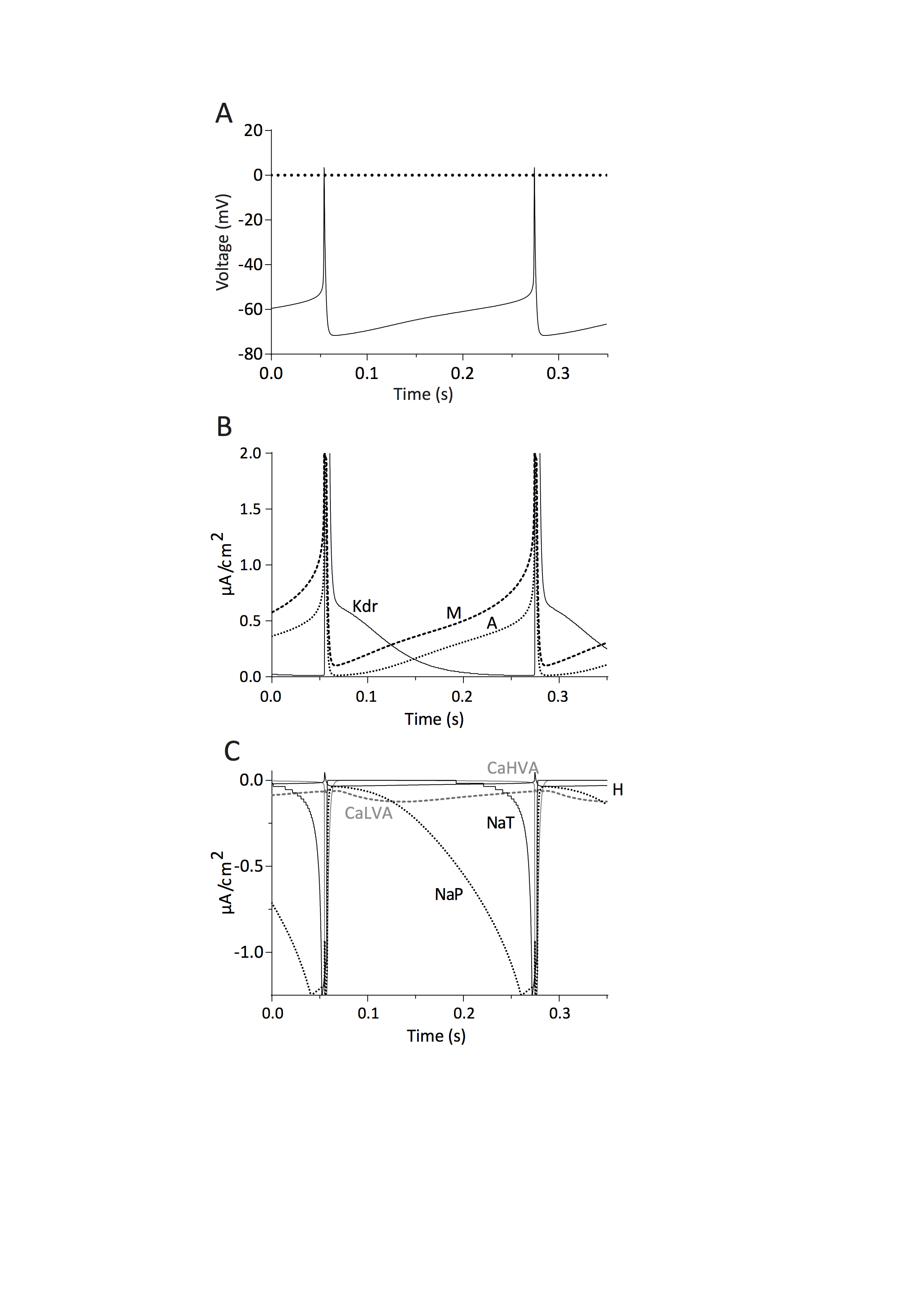 Fig. 10:
Fig. 10:
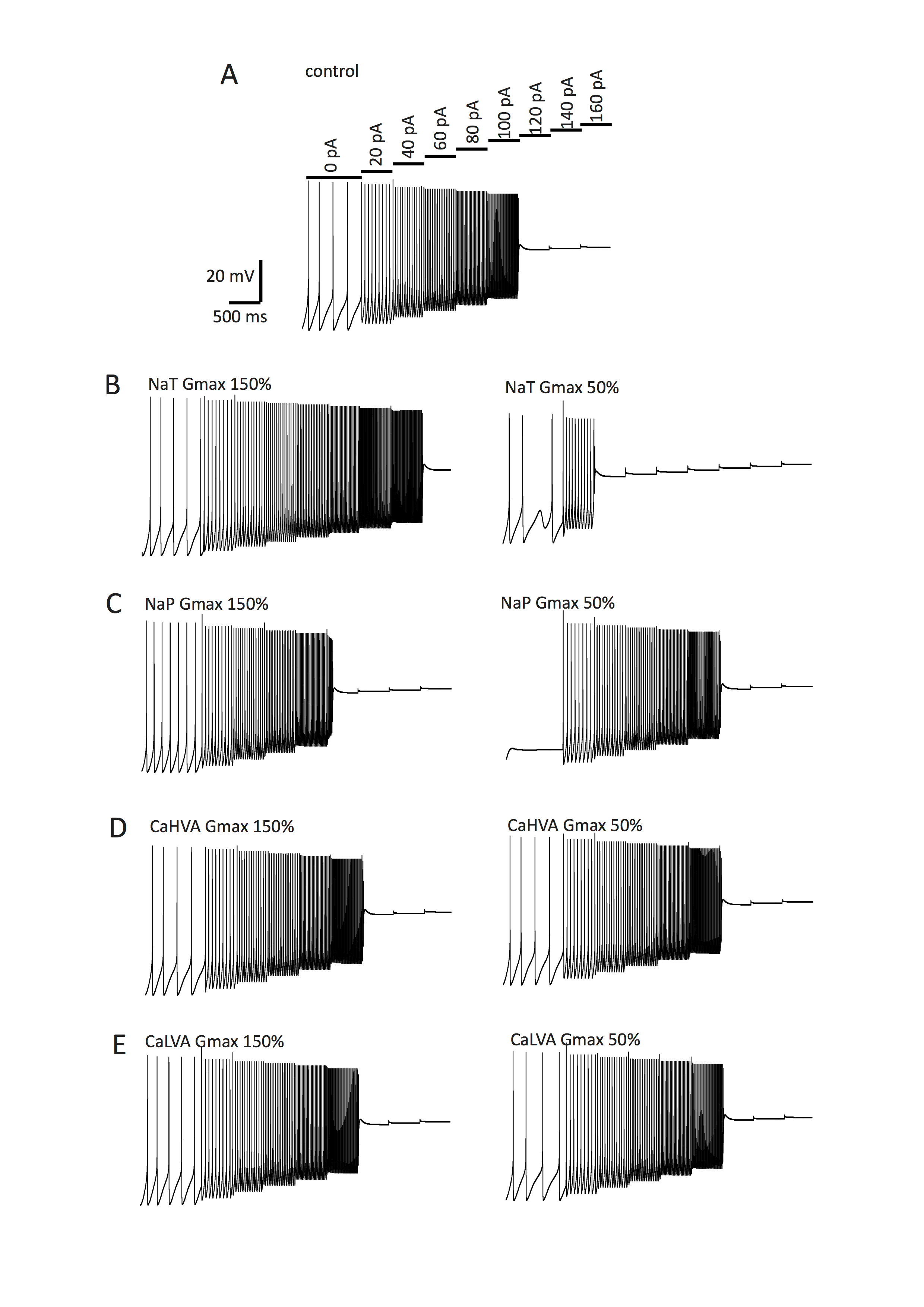


 Using the current/voltage clamp electrode located on the DA neuron,
current clamp injections are possible for predifined polarity,
duration and amplitude. Use these to explore the H-current mediated
voltage sag and A-type mediated delayed reporalisation as well as
instantaneous/sustained firing and threshold for depolarisation block
and thus reproduce Figures 7 and 10 from Dougalis et al., 2017 J
Comput Neurosci. Use the electrode in voltage clamp mode to observe
the current flowing from indvidual ionic conductances during the
voltage steps. Finally, using the parameter box, the user has full
access to experiment with the model by altering a number of critical
parameters controling individual conductances (reversal potential,
maximal conductance, midpoints and slope of activation and
inactivation of the gating mechanisms).For instance, by changing the
maximal conductance (gbar) of any ionic conductance while observing
the firing rate the data in Figure 8 from Dougalis et al., 2017 J
Comput Neurosci can be reproduced. Further parameters that control the
model behavior including, the rate of activation/inactivation of the
gating mechanisms, can be accessed from the NEURON main menu through
the following path NEURON main
Menu--Tools--Distributed_Mechanisms--Viewer--Name_Values--Parameters.
Any queries or problems with the model can be addressed to
antoniosdougalis at hotmail.com
last model file update: 17th April 2017, Antonios Dougalis
Figures from the paper:
Fig. 7:
Using the current/voltage clamp electrode located on the DA neuron,
current clamp injections are possible for predifined polarity,
duration and amplitude. Use these to explore the H-current mediated
voltage sag and A-type mediated delayed reporalisation as well as
instantaneous/sustained firing and threshold for depolarisation block
and thus reproduce Figures 7 and 10 from Dougalis et al., 2017 J
Comput Neurosci. Use the electrode in voltage clamp mode to observe
the current flowing from indvidual ionic conductances during the
voltage steps. Finally, using the parameter box, the user has full
access to experiment with the model by altering a number of critical
parameters controling individual conductances (reversal potential,
maximal conductance, midpoints and slope of activation and
inactivation of the gating mechanisms).For instance, by changing the
maximal conductance (gbar) of any ionic conductance while observing
the firing rate the data in Figure 8 from Dougalis et al., 2017 J
Comput Neurosci can be reproduced. Further parameters that control the
model behavior including, the rate of activation/inactivation of the
gating mechanisms, can be accessed from the NEURON main menu through
the following path NEURON main
Menu--Tools--Distributed_Mechanisms--Viewer--Name_Values--Parameters.
Any queries or problems with the model can be addressed to
antoniosdougalis at hotmail.com
last model file update: 17th April 2017, Antonios Dougalis
Figures from the paper:
Fig. 7:
 Fig. 8:
Fig. 8:
 Fig. 9:
Fig. 9:
 Fig. 10:
Fig. 10:
